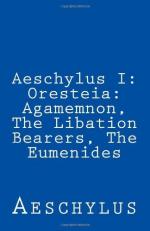|
This section contains 9,269 words (approx. 31 pages at 300 words per page) |

|
Dictionary of Literary Biography on Aeschylus
In the city of Athens in the fifth century B.C., Aeschylus, the Father of Tragedy, developed a spectacle in which choral song and dance alternated with solo speeches into one of the major genres of world literature. The ninety plays that Aeschylus wrote were performed frequently after his death, and the tragic drama remained a living tradition in the hands of his successors, Sophocles and Euripides. Tragedy also exerted a decisive influence on the development of literary criticism: Aristophanes' comedy Frogs (405 B.C.) is devoted to comparing and contrasting the tragic art of Aeschylus and Euripedes, and both the literary form and specific tragedies were analyzed in Aristotle's profoundly influential treatise, Poetics (late fourth century B.C.). Imitations of Greek tragedy written in the first century A.D. by the Roman playwright Seneca later exerted a powerful influence on the development of European theater during the Renaissance...
|
This section contains 9,269 words (approx. 31 pages at 300 words per page) |

|


